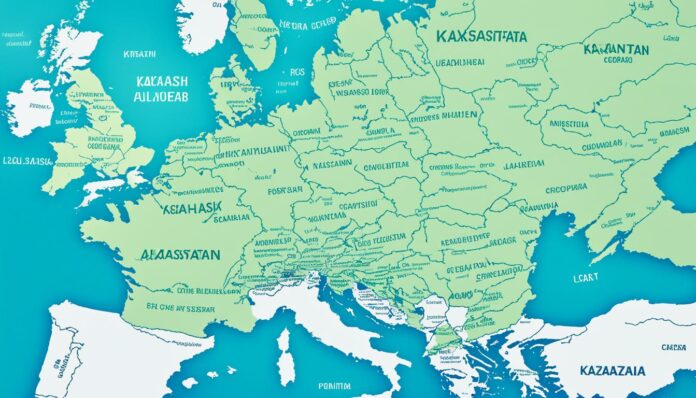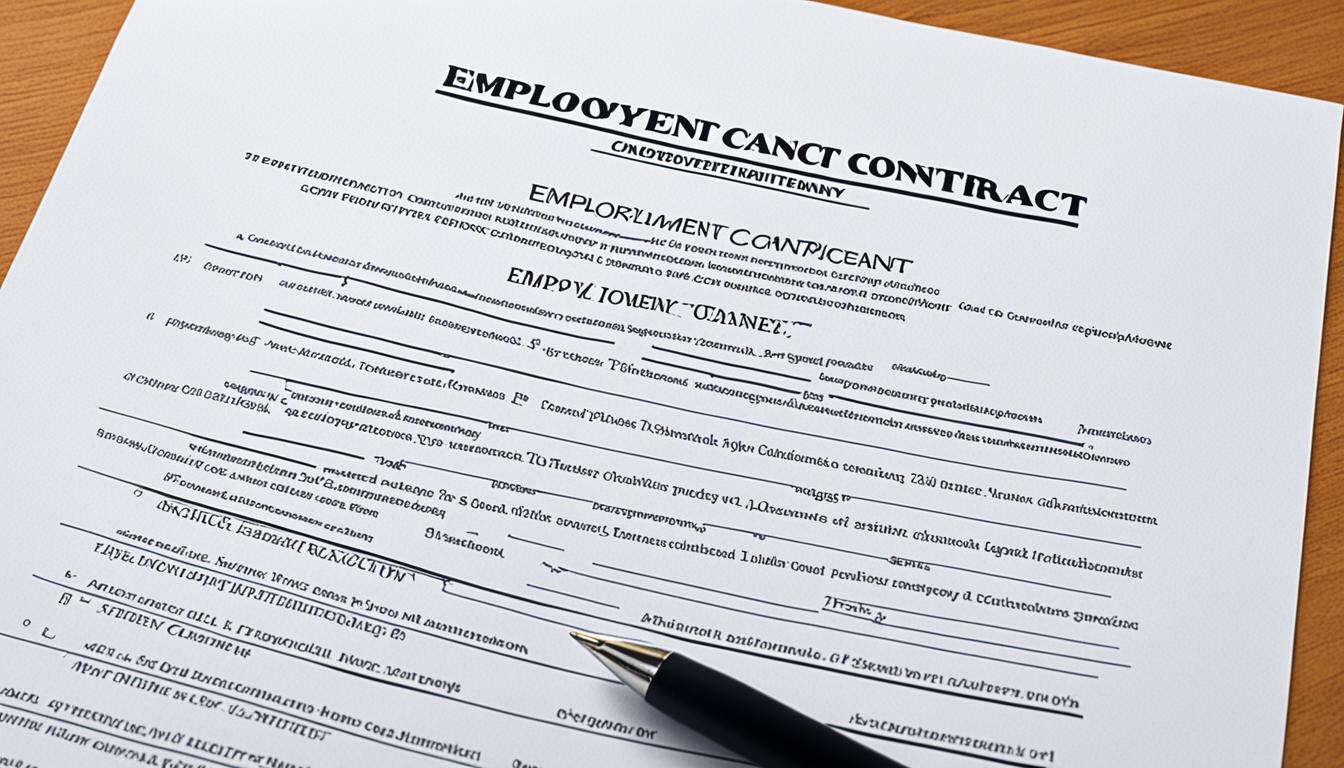
Knowing the work and labor laws in Kazakhstan matters a lot. It’s key for both businesses and workers. If you’re a Kazakhstani looking to work in Europe, or an employer hiring from Kazakhstan, it’s important to know these laws. They help you follow rules and make sure everyone is treated fairly at work. This article will cover everything from work contracts to how long you can work, how much time off you get, and even how work can end, giving you a good look at Kazakhstan’s work rules.
Key Takeaways
- Kazakhstan’s labor code sets the rules for hiring and working, laying out what employers and workers must do.
- All workers have to have a written job contract. It should talk about the job, when you work, how much you’ll get paid, and any trial period.
- In Kazakhstan, the usual work week is 40 hours. And every worker has the right to take at least 24 days off each year.
- If a job has to end, there are clear steps to follow. And it’s the employer’s job to keep the work place safe.
- By sticking to these laws, businesses can make sure they are doing things the right way. This also helps to keep the workplace safe and fair for everyone.
Employment Contracts in Kazakhstan
Written employment agreements are key in Kazakhstan. The law requires companies to provide these to new hires. These papers detail job terms, conditions, and what’s expected.
Hiring agreements must spell out certain details to be clear and legal. This includes what the job is, when to work, how much to pay, and if there’s a trial period. Being clear on these avoids problems later.
Employers should consider including the following information in the employment contract:
- Job description: Clearly define the scope of responsibilities and duties that the employee is expected to perform.
- Working hours: Specify the standard working hours and any provisions for overtime, as per the labor code.
- Compensation: Outline the agreed-upon salary or wage, along with any additional benefits or allowances.
- Probationary periods: Specify the duration of probation, if applicable, during which the employer assesses the employee’s suitability for the role.
Jobs in Kazakhstan can be either for a set time or ongoing. If there’s no clear end, it’s seen as lasting until further notice. But it’s vital to define the job type and length to prevent mix-ups.
Offering job contracts ensures a company follows the law and is open with its staff. These documents are key for staying within legal lines and looking out for everyone’s rights and needs.
Key Takeaways:
- The Labor Code of Kazakhstan requires issuing employment contracts.
- These agreements need to cover crucial info like the job, hours, pay, and trial periods.
- Contracts can be for a set time or ongoing, with the latter being assumed if not said.

| Benefits of Employment Contracts in Kazakhstan | Ensures legal compliance and protection for both employers and employees |
|---|---|
| 1. Clarity on job expectations and responsibilities | 1. Reduces the risk of disputes and misunderstandings |
| 2. Protection of employee rights and entitlements | 2. Provides a framework for resolving employment-related issues |
| 3. Legal basis for termination and severance procedures | 3. Establishes trust and transparency in the employment relationship |
Working Hours, Leave Entitlements, and Remuneration
In Kazakhstan, knowing about working hours, leave, and pay rules is crucial. This knowledge can make sure work is fair and enjoyable for everyone involved.
The usual work week here is 40 hours, spread over five or six days. Employers and employees use this as a guide. It helps them plan work times that keep workers happy and the job well done.
All workers in Kazakhstan get at least 24 days off a year. This number of days grows as they stay longer with their job. They earn more time off for fun or rest as a reward for sticking around.
The law also guarantees paid time off when sick or having a baby. This shows the country cares about workers’ health and family needs. It gives them the chance to get well or take care without worrying about money.
Getting fair pay is another big deal in Kazakhstan. There’s a minimum pay rate set by the government. Employers must pay at least this much to be fair. This way, everyone can live a decent life.
Wages can be paid monthly or twice a month here. But however often, it has to be in the local money. This is to follow the rules and make sure things are fair for workers.
Following these rules makes the work environment good for everyone. Employers know how to be fair, and workers get what they rightfully should have.
| Aspect | Regulations |
|---|---|
| Working Hours | Standard working week of 40 hours |
| Leave Entitlements | Minimum of 24 days of annual leave, increasing based on years of service |
| Remuneration | Employers must ensure employees receive at least the minimum wage set by the government. |
Termination and Severance in Kazakhstan
In Kazakhstan, you can leave your job by quitting, agreeing with your boss, or being let go. The country’s labor laws detail why and how someone can be fired. Either the worker or the employer can start the process.
Ending a job must be fair and follow the law. Employers must use the right reasons and ways to let someone go. This makes sure that quitting is honest and respects everyone’s rights.
Usually, there’s no pay when someone leaves their job. But, when it is needed, employers must look at when they have to pay. This helps them keep their promises and their teams happy.
Knowing the rules about ending jobs is key for companies. They should follow these rules to stay out of trouble. This also makes their workplaces better for everyone.
Key Takeaways:
- Termination in Kazakhstan can occur through resignation, mutual agreement, or dismissal.
- Dismissal can be initiated by either the employer or employee, subject to specific grounds and procedures outlined in the Labor Code.
- In general, severance pay is not required unless specified by law or in cases of redundancy.
- Employers must adhere to the procedures and grounds outlined in the labor code to ensure legal and fair termination of employment.

Conclusion
Knowing and following employment laws in Kazakhstan is key for everyone involved. Employers keep their workplace safe and healthy by following these laws. They need to focus on safety, follow health and safety rules, and train their staff.
Workers have rights like days off, fair pay, and how work ends. Knowing their rights helps employees get treated well and stay protected by law. This is good for both workers and their bosses, helping avoid legal problems.
So, obeying work laws is vital for a good work atmosphere in Kazakhstan. Making safety a top concern and understanding your labor rights are very important. This shows that employers truly care about their team and avoids legal troubles.
FAQ
What are the legal requirements for working in Europe as a Kazakhstani citizen?
To work in Europe, Kazakhstani citizens should know the rules of the country. They might need a work permit or visa. This depends on the country they want to work in.
What are the employment regulations in Kazakhstan?
Jobs in Kazakhstan follow the Labor Code. It says employers must give written job contracts. These contracts lay out the job, hours, pay, and any trial periods.
How many working hours are common in Kazakhstan? What about annual leave entitlement?
In Kazakhstan, a regular work week is 40 hours spread over either five or six days. Workers get at least 24 days off each year. This amount of annual leave gets more with longer time in the job.
Is there a minimum wage in Kazakhstan?
Kazakhstan has a minimum wage set by the government. Employers have to pay their workers this minimum. Pay can be monthly or bi-monthly, in the local money.
What are the procedures for termination of employment in Kazakhstan?
Leaving a job in Kazakhstan can happen in a few ways, like quitting or by agreement. Either the boss or the worker can end the job, with good reason. The Labor Code might require a worker be paid extra when they leave, but not always.
What responsibilities do employers and employees have regarding workplace safety in Kazakhstan?
It’s the boss’s job in Kazakhstan to keep the workplace safe and healthy, following the safety laws. This means giving workers the right training. Workers can say no to dangerous work. But, everyone needs to think about safety and follow the rules.
